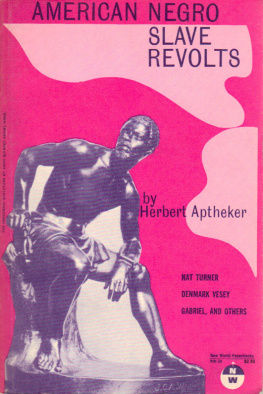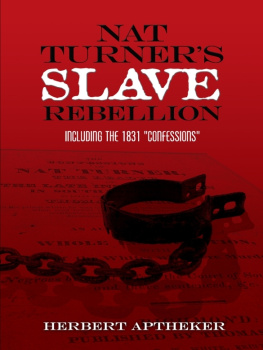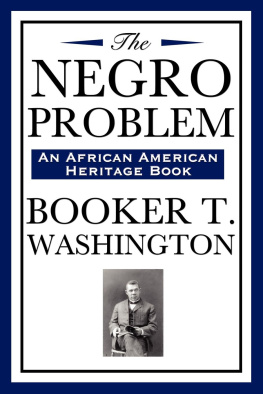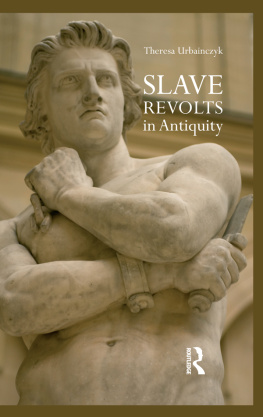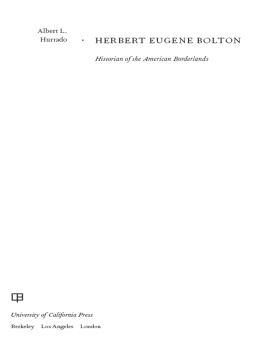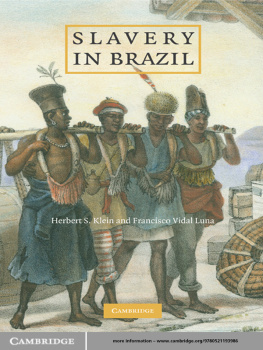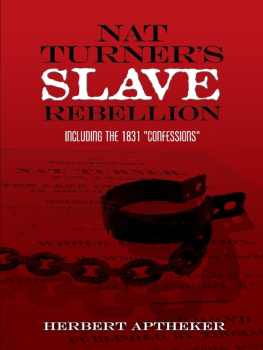Aptheker - American Negro slave revolts
Here you can read online Aptheker - American Negro slave revolts full text of the book (entire story) in english for free. Download pdf and epub, get meaning, cover and reviews about this ebook. City: New York, United States, year: 1974, publisher: International Publishers;Columbia University Press, genre: Politics. Description of the work, (preface) as well as reviews are available. Best literature library LitArk.com created for fans of good reading and offers a wide selection of genres:
Romance novel
Science fiction
Adventure
Detective
Science
History
Home and family
Prose
Art
Politics
Computer
Non-fiction
Religion
Business
Children
Humor
Choose a favorite category and find really read worthwhile books. Enjoy immersion in the world of imagination, feel the emotions of the characters or learn something new for yourself, make an fascinating discovery.
American Negro slave revolts: summary, description and annotation
We offer to read an annotation, description, summary or preface (depends on what the author of the book "American Negro slave revolts" wrote himself). If you haven't found the necessary information about the book — write in the comments, we will try to find it.
American Negro slave revolts — read online for free the complete book (whole text) full work
Below is the text of the book, divided by pages. System saving the place of the last page read, allows you to conveniently read the book "American Negro slave revolts" online for free, without having to search again every time where you left off. Put a bookmark, and you can go to the page where you finished reading at any time.
Font size:
Interval:
Bookmark:
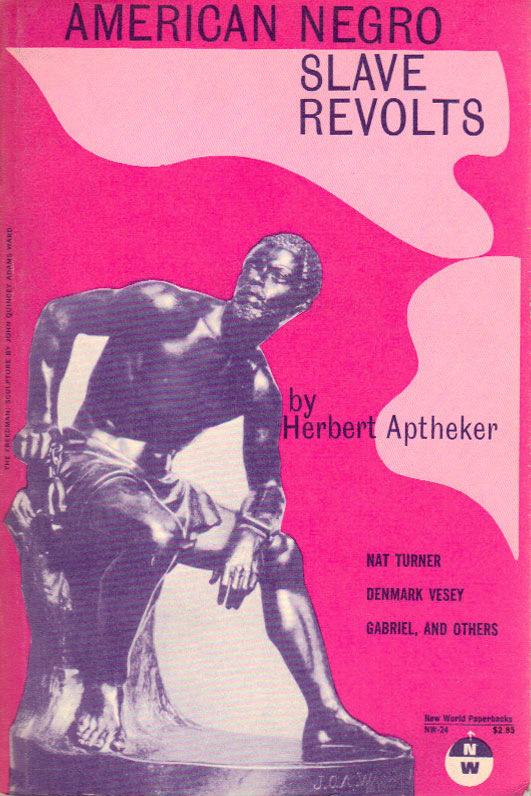
Writing on slave unrest in the United Statesand doing this in 1969one feels more like a news reporter than a historian. While recently the California statesman, Ronald Reagan, found the ghetto rebels of today to be mad dogs, a South Carolina statesman of 1823 found plantation rebels of his day to be monsters in human shape.
Which humans are dogs and monsters depends, I suggest, upon class and, often, upon color and nationality, too. Thus, early in the summer of 1831, the U.S. press was lavish in its praise of Polish rebels against tsarist oppression; none was more lavish than the Southern press. But then, late in August, came news of the uprising in Virginia of slaves led by Nat Turner; while a week earlier rebels in Poland were sons of the noble, now the Virginia rebels were banditti, blood-thirsty wolves and deluded wretches. How shall one explain this extraordinary shift except to observe that now the rebels were at home, not six thousand miles away, and that now the rebels were not white, but black?
Humans, no matter of what color, being humans have rebelled when their treatment was bestial and when opportunity and capacity for rebellion was present. The point was made nicely during the debates creating the U.S. Constitution. The topic at the moment was tax and fiscal policy. A Maryland delegate suggested that the principle to be followed was to treat all property alikehe meant, he added, to include in this slave property. It was not often that the octogenarian, Benjamin Franklin, participated in those debates, but the Marylanders remark making identical all types of property provoked the Pennsylvanian enough so that he asked Washington for the floor. Getting it, Franklin asked if the Marylander would permit a question. Permission being granted, Franklin posed one of the most pregnant questions ever asked: Noting that the delegate had equated slave property with all other forms of property, Franklin asked: Will the gentleman from Maryland tell me of an insurrection of sheep?
Slavery, being violative of central religious concepts and of the founding principles of this nation, required an elaborate rationalization. Racism provided this; it derived out of as it sustained the system of modern slavery, that is, that system created in the sixteenth century as part of the world-wide development of capitalism and the replacement of feudalism.
Fundamental to this rationalization was the idea at first of the actual subhumanity of colored peoples; when persistence in this became impossible it was altered to affirm the inherent, indelible and significant inferiority of such peoples.
This rationalization made slavery not only appropriate; believers could now feel absolutely philanthropic while exercising their slaveholding responsibilitiesand enjoying its benefits. Central to this mythology was the idea that colored peoples did not detest or resent enslavement; particularly black peoples, it was held, delighted in their chains. Of course, this mythology had its contradictions; thus, while it was generally insisted that the black was especially and naturally meek and docile, on the other hand, and simultaneously, it was held that he wasor could beparticularly brutal and savage.
But in accordance with the central myth for the United States the idyllic character of plantation slaverydiscontent and rebelliousness were held to be altogether rare and exceptionalwhatever might have been true elsewhere and at other times. The centrality of this for the slaveholding class and for their apologists is clear. The classical exponent and defender of this viewpoint in historiography was Ulrich Bonnell Phillips, whose American Negro Slavery (1918) was the bible of white supremacy in the area of history, as, in about the same period, was Beans work in anatomy, Burgess in political economy, and Fergusons in psychology.
Bean was a fraud, Burgess a medievalist, Ferguson a charlatan, and Phillips a devout white supremacist who was as incapable of writing truthfully of what it meant to be a Negro slave in the United States as it would have been for Joseph Goebbels to have written truthfully of what it meant to be a Jew in post-World War I Germany.
Contemporary evidencenewspapers, court records, journals, diaries, letters, speechesmake crystal clear to anyone who views black men and women as human beings that American Negro slavery was a monstrously cruel system of exploitation and that its victims despised it and sought in every possible way to oppose it.
Most meant also, of course, to live through it, and survival is a form of struggle. But everythingfrom songs to tales, from heroes to villains, from religion to music to actionshows that the central idea and the never absent dream was to end slavery, to be free.
The highest form of protest was rebellion or conspiracy to rebel. This is collective; it involves an all-out commitment with death the sure price for failure and with success not likely. Its development and, especially, its fruition, require enormous care, effort and dedication. It is important to bear this in mind; I mean the fact that rebellion and conspiracy to rebel reflect the highest forms of protest. Hence, where this form is present one may properly conclude that it reflects deep and widespread unrest; the insurrection or the plot was, as it were, the flash of lightning that told of the profounder atmospheric disturbance creating it.
Protest among slaves in the United States took individual and collective forms. Among the former were laziness, thievishness, irresponsibility, flight, assassination, arson, sabotage of tools and animals, self-injury, infanticide; of the latter were group flights, group arson (verging on insurrection), the existence of maroons outlying, belligerent fugitive slavesand conspiracy and uprisings. Note also should be taken of the fact that among the pioneers and significant members of the organized anti-slavery movement in the United States were many free Negroes (of whom there were 500,000 in 1860) and/or fugitive slaves.
Some generalizations concerning slave insurrections and conspiracies in the United States may be of value. The uprisings and plots came in waves, as though anger accumulated and vented itself and then a period of rest and recuperation was needed before the next upsurge. Certainly, waves were the rule, with clearly defined periods, as: 1710-1722, 1730-1740, 1790-1802, 1819-1823, 1829-1832, 1850-1860. The uprisings were of slaves; that is, free Negro participation was uncommon and white participation (except after 1850) was rare. There is some evidence (especially for the last years of slavery) of plans for land and property distribution as well as an attack upon slavery as such. There is indication also of a pan-Black tiethus, some talk of the West Indies and even of Africa, though the evidence is sparse and at times ambiguous.
External events had significant influence; for example, reports of unrest in the West Indies; dramatic political campaigns in the United States; war (as that of the Revolution or of 1812)these, and other disturbing phenomena, reached the consciousness of the slaves and helped stimulate outbreaks.
Slave unrest was especially marked in the decade prior to the Civil Warall forms of unrest. This had a deeper content than before, and often there were evidences of Southern white participation in that decade. It may be added that if this is not understood one can understand neither all the sources nor the impact of John Browns effort nor all the sources of the Civil War itself.
Font size:
Interval:
Bookmark:
Similar books «American Negro slave revolts»
Look at similar books to American Negro slave revolts. We have selected literature similar in name and meaning in the hope of providing readers with more options to find new, interesting, not yet read works.
Discussion, reviews of the book American Negro slave revolts and just readers' own opinions. Leave your comments, write what you think about the work, its meaning or the main characters. Specify what exactly you liked and what you didn't like, and why you think so.

